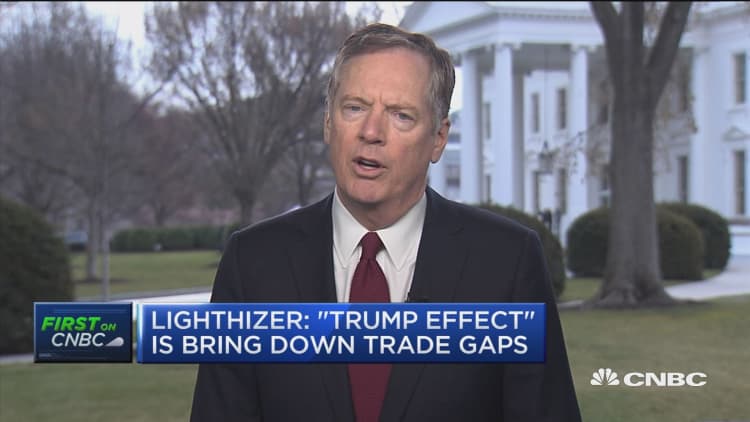
U.S. Trade Representative Robert Lighthizer said a deal with South Korea reforms three separate areas of the trade relationship: steel, currency and the 6-year-old pact known as KORUS.
"I would say you have to think of this as really three agreements that are independent but that define a relationship," Lighthizer said Wednesday on CNBC's "Squawk Box."
In the deal announced by the Trump administration Tuesday, South Korea has agreed to cut its average annual steel exports to the U.S. by 30 percent, which Lighthizer said is a boon for American steel makers.
"A lot of people believe, and I think I agree with them, that Korea is part of the problem on steel," he said.
The U.S. trading partner will also be subject to a 10 percent tariff on aluminum.
On currency, Lighthizer said the agreement will establish a process to prevent "competitive devaluation" of the dollar, whereby South Korea deliberately lowers its currency to give its exports a competitive edge. The Treasury's goal in working to prevent this practice is to stabilize the greenback, Lighthizer said.
The U.S.-Korea Free Trade Agreement, established in 2007 and known as KORUS, will also receive a tuneup on vehicle sales.
"The president's view has been — and I agree with it — it has not been particularly good for the United States. We've had increases in trade deficits and really not substantial increases in sales," Lighthizer said.
To revamp the deal, the Trump administration is postponing a scheduled phaseout of 25 percent tariffs on small truck imports from South Korea. Rather than allow the tariffs to expire in 2021, President Donald Trump has extended the tariff by 20 years, to 2041.
Doing so, Lighthizer said, will protect the U.S. automobile industry against an influx of Korean truck imports.
The deal also doubles the cap on U.S. truck exports to South Korea to 50,000 per manufacturer, and Lighthizer said it will get rid of "other barriers" to sales, including certain environmental standards and customs standards.
"So I guess I'd say all three of these are very important, I think they're very historic when taken together and we're very proud of them," Lighthizer said.


